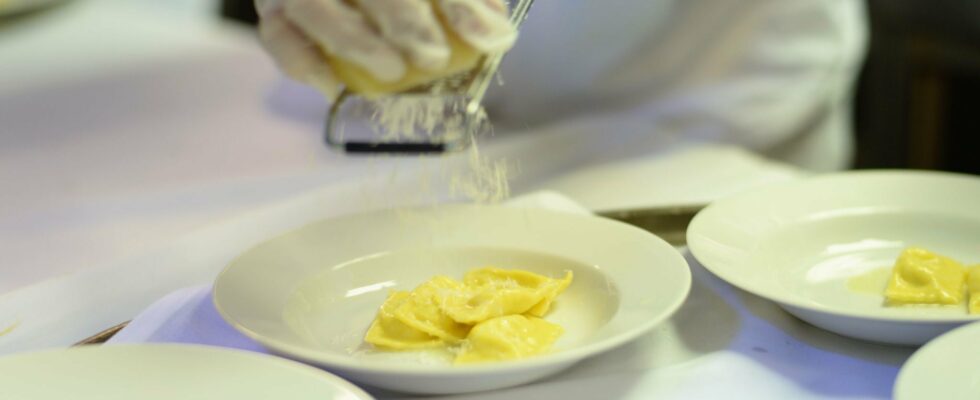“How important it is to be at the table, to drink a glass of wine, to talk… How many wars could have been avoided over a good dinner?”, wondered the Italian Minister of Agriculture and Food Sovereignty Francesco Lollobrigida recently. Preferably with Made in Italy dishes to adorn the discussion table. Relegated to the rank of yet another blunder, this statement on the “diplomacy of conviviality” has not been very convincing, at a time when conflicts in Ukraine and the Middle East continue to rage. If in Rome this type of position raises a smile, in Brussels it raises teeth. In recent months, the activism of the Italian government on agri-food issues has reached such levels that there is no hesitation in denouncing aggressive “gastrodiplomacy”.
Francesco Lollobrigida is on all fronts in the fight against synthetic foods, insect flours, health warnings on alcohol and the Nutri-Score. Last autumn, Giorgia Meloni’s government was the first in the world to ban companies from producing and selling artificial meat under penalty of fines of up to 60,000 euros. And who cares if the sale of such products is not yet authorised in the EU! He prided himself on being at the “forefront of a battle of civilisation against Frankenstein food”.
“The most important identity question”
This offensive accelerated last year. On March 23, 2023, Italy submitted to UNESCO the candidacy of transalpine cuisine – as a whole – to the intangible cultural heritage of humanity. “Without taking anything away from Mexican, French or Japanese cuisine, I believe that ours has no rival in the world,” insisted Francesco Lollobrigida at the time. Enough to flatter the “gastronationalism” claimed by the vast majority of Italians who maintain a passionate, even passionate relationship with their country’s recipes. “The food question has become the most important identity question. It is the only flag that national pride can deploy and this borders on culinary nationalism, explains food historian Alberto Grandi. The government claims a priori that everything that is Made in Italy is necessarily healthy, and everything that is not, potentially bad.”
In Brussels, Italy was particularly vehement against the Nutri-Score (nutritional labelling). Its permanent representation to the European Commission, the lobbies of its agri-food industry and the powerful Confederation of Farmers (Coldiretti) were tirelessly involved in blocking the adoption of this harmonised system at EU level. France claimed that this would improve consumer information without compromising the competitiveness of local products. But Rome denounced a “regular offensive launched by Paris and Berlin against olive oil, parmesan and mozzarella”, its flagship export products.
The heralds of culinary Made in Italy are offended that they can be given an infamous D while frozen fries or sodas are adorned with reassuring letters. In its battle, the Italian government was able to count on the support of Spain and the Czech Republic to torpedo the adoption of the Nutri-Score. In vain. Another country in the sights of transalpine “gastrodiplomacy”: Ireland. It will be the first EU country to guarantee, from 2026, the affixing of complete labeling on all alcoholic products indicating the health risks associated with their consumption. Indignation among European winemakers, led by Italians. The Meloni government has sounded the general mobilization to block the extension of this measure to other EU countries. “This project divides Europe and we will activate all possible forms of resistance to prevent it,” proclaims Francesco Lollobrigida. “The Irish have a problem with alcohol, not the Italians. Wine is a product of excellence that represents our History and our Culture.” Above all, it represents an important pillar of the transalpine economy.
More generally, the peninsula’s agri-food exports broke a new record in 2022 with a sales volume of 60.7 billion euros, an increase of 17% compared to 2021. Figures that are not based on virtuous small producers, but on large industry. Of these approximately 60 billion euros in exports, almost 10 billion are generated by the giant Ferrero alone. Barilla and Lactalis are among the other champions of this agri-food Made In Italy defended so fiercely by the Meloni government. Francesco Lollobrigida should perhaps organize a dinner in Brussels with his counterparts to avoid a gastronomic conflict.
